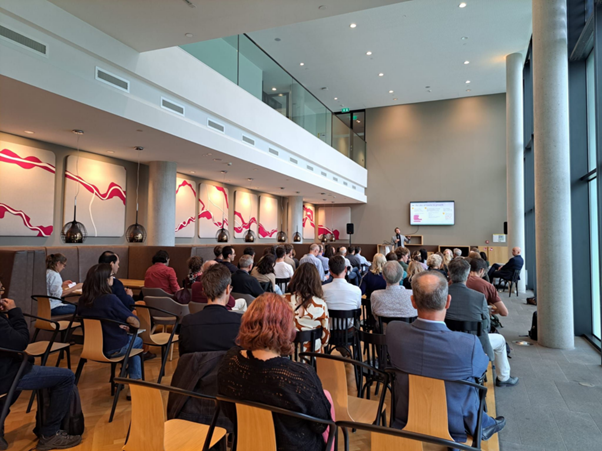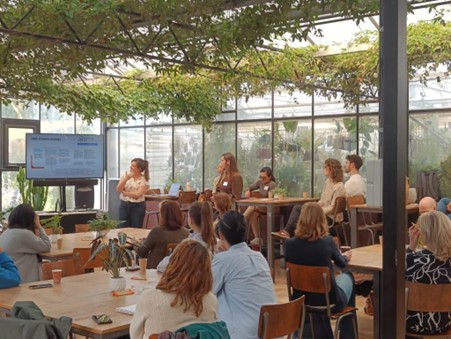EWUU has participated in a series of inspiring events during Utrecht Science Week that focused on collaboration and the future of research. Our institute 4 a Circular Society (i4CS), institute 4 Preventive Health (i4PH), Centre for Living Technologies, Centre for Unusual Collaborations and our AI Programme were present at Utrecht Science Week, during different gatherings. A summary:
UMC Utrecht Research Days
On 30 September we kicked off Utrecht Science Week at the UMC Utrecht Research Days, where researchers from diverse fields came together to inspire, connect, and share their innovative projects. This year’s theme ”team science” encouraged participants to explore our interdisciplinary collaborations, making it a perfect setting for networking.

The Boulevard of Dreams served as a hub for discussions on various health-related issues, such as circularity in healthcare. Our institute 4 a Circular Society showcased research the ESCH-R consortium with a poster presentation and a example of a waste created during cataract surgery – which sparked lots of insightful discussions amongst visitors!
Our Centre for Unusual Collaborations hosted the workshop Cross the line – Interdisciplinary Research to explore together the challenges in interdisciplinary collaborations and to practice with tools to help to overcome these challenges. Throughout these days, a diverse range of CUCo-funded projects showcased their interdisciplinary work during the ‘Boulevard of Dreams’ : IPOP-NL Interdisciplinary Pain Research Platform, Preservation of Female Reproductive Health, Exploring Digital Health Monitoring With a Complex Systems Approach and Better Wave than Worry

Panel Discussions
Also on September 30, we participated in a thought-provoking panel discussion titled “When Does Research Become Waste?” This event shed light on the significant environmental footprint of biomedical research, which accounts for about 2% of global plastic waste. The session explored the delicate balance between the social value, scientific value, and ecological impact of (bio)medical research.
The panel included scientific coordinator Florijn Dekkers, who focused on circular strategies in healthcare. This interactive discussion encouraged participants to share their insights and envision sustainable practices for the future of research.
Jeffery Beekman of our Centre for Living Technologies also participated in this panel discussion . Research is considered wasteful when it does not lead to meaningful scientific, social, or practical outcomes. This can occur due to poorly defined research questions, ineffective methodologies, or a lack of alignment with societal needs.
Additionally our Centre for Living Technologies took part in the session titled “Customised Medicine – How Your Own Cells Predict Whether a Medicine Works for You.” This session focused on personalized medicine and its potential to transform healthcare. By utilizing patients’ own cells to determine medication responses, this innovative approach aims to tailor treatments specifically for individuals. Attendees explored advanced techniques that enable healthcare to move away from a one-size-fits-all model, providing more precise and effective treatments for patients.
Circular Economy Festival
On October 3, we attended the Circular Economy Festival at Utrecht Science Park, dedicated to promoting the Circular Economy in the region. The festival emphasised regional collaboration around themes such as circular procurement, business activity, and the sustainable use of space.

Get-together
On 3 October our institute for Preventive Health (i4PH) in collaboration with the UMC Utrecht prevention platform hosted a get-together centered on lifestyle and healthy living environments. Set against the lush backdrop of the Botanical Gardens the session attracted a diverse group of researchers, policy makers, and students, creating an atmosphere of collaborative dialogue and networking.
The evnt then continued with two inspiring project showcases:
Life & Body Program at UMC Utrecht: Wiepke Cahn, Professor of Physical Health in Psychiatric Disorders and Psychiatrist, shared insights on the Life & Body program, which aims to address the complex needs of patients with both psychiatric and physical disorders.
Cartesius Neighbourhood: Marije Lammers, Postdoctoral Researcher on Healthy Living Environments, and Martin Chaigneau, Senior Advisor on Healthy Neighbourhoods from Utrecht Municipality, presented the concept of the Cartesius neighborhood—a visionary urban development inspired by the principles of Blue Zones.
Read more on the different webpages:
Our institute 4 a Circular Society (i4CS)
Our institute 4 Preventive Health (i4PH)